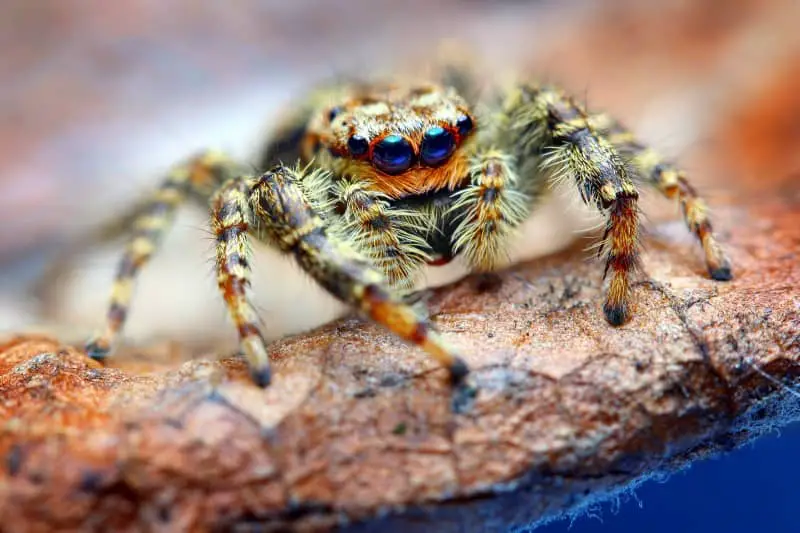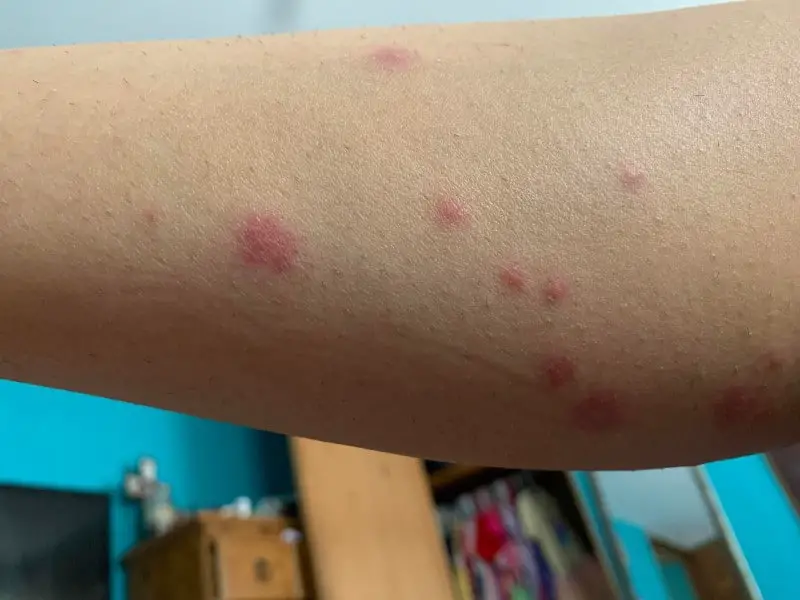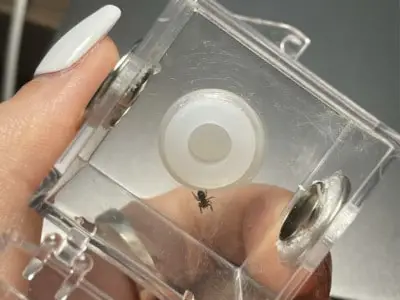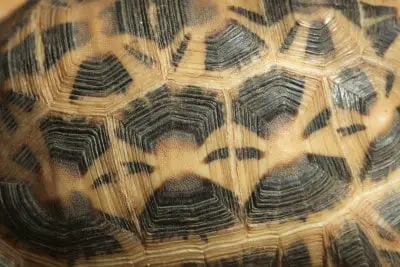Like any other soon-to-be spider owner, it is essential to research all your options to find out which pet is safe for you, especially if you have a family. You are probably aware that jumping spiders are prolific jumpers, but the little-known fact is how aggressive they can be when provoked.
Jumping spiders can bite, especially when they feel threatened. However, it is their last resort. The spider’s bite is only severe to allergic people, and, fortunately, others are safe and can heal quickly depending on the affected individual.
Different animals have various defense strategies to help them survive in the wild. We will take a look at the jumping spider’s techniques as we present all the details you need to know about their hidden skills. Read on as we enlighten you.

Can Jumping Spiders Bite?
Those encountering the jumping spiders for the first time are often frightened of them and worry about their potent venom. Their fears escalate further, knowing that they also jump fast, which is enough to frighten a skeptical stranger. They are undoubtedly one of the cutest pets you can keep, but is the cute face only a cover-up?
A jumping spider can bite you, but it is very rare and happens only in isolated cases. You may not come across several people claiming to have experienced the bites, and even the victims in the few cases say that the bites were mild.
When the spider is afraid of you on the first encounter, its first instinct is usually flight. Since you are bigger and it stands no chance of bringing you down, it has to flee, and the only time that they resort to biting is when there is no way to escape.
Jumping spiders are shy and skittish and don’t enjoy a lot of touching, especially from strangers, and it takes a while for them to trust you and feel safe under your hold.

Why Do Jumping Spiders Bite?
Once you know the primary reasons why spiders bite, you can avoid falling victim and protect yourself and your loved ones. Let’s look at the major factors that can push these cute little creatures to bite you.
If you pick up a spider roughly, you can unintentionally scare it and trigger its bite response. Since the arachnids’ bodies are soft, first-time handlers find themselves squishing them during handling, which the spider immediately interprets as aggression. Secondly, mother spiders tend to be overprotective of their eggs, and if an intruder threatens to take them away, they will be hostile. Veteran keepers know that it’s best to stay away from the eggs in the tank while in the mother’s presence; else, they risk biting.
Spiders will only bite if they believe that their life depends on it or when protecting their precious eggs. To be safe, you need to give them space when they are newly purchased. Remember to be calm when you handle them because shaking out of fright with them in your hold can trigger a defensive response.
Read More: Do Spiders Bite Humans for No Reason
Jumping Spider Bite Experiences
Most people fear spider bites since they are famous for being venomous and victim accounts only make it worse. The bite’s severity varies significantly depending on the spider’s venom level; some are mild, while others need urgent medical attention. We compiled various accounts from affected people to find out how the jumping spider’s bite feels.
A jumping spider and a mosquito bite are quite similar in size and severity. However, you can look out for signs such as persistent itching, stinging sensation, and swelling. The symptoms usually subside within two days but could worsen in some cases. Jumping spider bites are not highly venomous and pose no serious threat to humans. The creatures are also quite shy and tend to run away, only biting when it is the last resort.
Although the spider’s bite isn’t fatal, you should still avoid crossing paths with them while in the wild. Try not to touch or lift them because wild creatures are unfamiliar to human touch and regard you as a predator. Also, note that the jumping spider’s venom reacts differently depending on the casualty, especially if you are allergic. If your spider accidentally bites you, you can find means to reduce the pain or seek medical help as soon as you can.
One easily identifiable feature of a spider’s fang is that it leaves two tiny marks on the affected spot. Jumping spiders will only bite when they see impending danger; therefore, it is unlikely that they would suddenly bite you. They can sting you only in certain situations where you trap, hurt, step on, or squish its legs with your hands.
Dangers of a Jumping Spider Bite
The spiders may look cute at first, but there are still scary because of the deep-seated belief that they are lethal. It explains why some people are afraid of touching or coming close to them. Since we have noted that they can bite, let’s find out how lethal the jumping spider be.
The jumping spider poses no grave harm to you or your loved ones. Their bites are not fatal unless the victim has an underlying issue like allergies. Such people are at high risk of swelling all over, leading to obstruction of vital body organs. On the other hand, the non-allergic individuals are safe in this case, and they tend to heal faster. It will only be a concern if the victim is not aware of being allergic. The spider’s venom is specifically designed for attacking small prey like insects and defense from small predators. Therefore, the venom is not likely to paralyze humans since they are giant, unlike tiny insects.
Luckily, these spiders’ bites are not excruciating; hence, may not disrupt you from your daily activities. It also means that the sting is mild and also wears off quickly. The spider is a great species to keep as a pet since it is easy to care for and maintain.
The bottom line is, this spider doesn’t hurt humans, and you can consider it a plus to have them in your house because they have great hunting skills and will help you get rid of bugs in your home, freeing your home from insect invasion.
Are Jumping Spiders Poisonous?
Another concern among potential spider owners is whether their pet is poisonous or not. It is particularly essential when you have a family, and you want to keep them safe. Since you cannot test it yourself, we investigated it for you.
The good news is that jumping spiders are not poisonous, meaning that they cannot harm humans. They are only venomous to prey, that is, insects or prey their size or smaller. They use the venom to paralyze their prey during hunting to prevent them from escaping their hold together with their powerful jaws. Biting also acts as a defense against their enemies. Jumping spiders are among the few creatures that bite and inject their prey with venom, making them one of the most skillful hunters among spider species.
Unlike vicious creatures, poisonous animals use different tactics to deal with their predators. They secrete poison via their skin to irritate their enemies and protect them from attacks. A jumping spider’s bite is not lethal to humans, as the symptoms range from swelling to itching, which subsides within days. However, the victims need to seek medical attention to help them heal faster and prevent any complications. It also helps if you carry the spider along to help the doctors identify it and deal with any arising issues.
Treating a Jumping Spider Bite
The spider bite doesn’t cause grave concerns to the victims, with most individuals healing from it at home without seeing a doctor in the first few days of exposure to the venom. Fortunately, there are do-it-yourself remedies that you can use to ease the pain.
If you see no need to visit a doctor because the bite is mild, you can clean the region using water and soap. Next, if it is on your hand or leg, you can press an ice pack on the wound to relieve the pain. It is necessary to keep it raised to prevent the affected area from swelling. In case the itching persists, and the pain becomes unbearable, you can take some painkillers over the counter as you try to manage it before you see a doctor. Lastly, it is advisable to report to the nearest hospital whenever the situation worsens for more specialized care.
It is unusual for the symptoms to span over forty-eight hours after the bite, and it will warrant immediate medical attention. Look out for more swelling, severe headaches, nausea, and difficulty in breathing. Research has shown that severe bites often occur to those allergic to the spider’s venom or those bitten by lethal spiders. It is only through a medical checkup that you can better understand your situation.
How To Avoid Jumping Spider Bites
If you live in an area with a high jumping spider or prey population, it is common to bump into one or two. You cannot avoid the encounter, but you can reduce the chances of bites by staying out of their way. Without laid down measures for you and your family, you will often become victims of the spider’s bites.
First, it is critical to check and clean your cupboards frequently. Secondly, you can spray repellant substances such as peppermint to keep wild spiders at bay. Also, check on your shoes for spiders to remove any hiding spiders from the shoes you seldom wear. It is risky for them to hide in your shoes since they are likely to bite your feet as you wear them.
Go further to clean house corners and remove any silk you find. If you are a new spider keeper, it is advisable to wear gloves and long-sleeved clothes if you must open the pet tank. Finally, always wear closed shoes and shake off clothes and beddings before using them.
Finally
Primarily, jumping spiders are quite gentle with humans. Besides, they understand that they are no match to giant creatures like you and would rather retreat during confrontations. They may be one of the most skilled hunters in the spider family, but it doesn’t mean that they like biting humans as they do with their prey.
However, they wouldn’t hesitate to bite to escape and save their life if you are rough or hold them tight. The spiders can also sense fear and tell that something is wrong. Therefore, it helps to be calm when you hold them and let them crawl freely on your hand. With time, they will trust you and no longer see you as a potential threat.
Read more:








